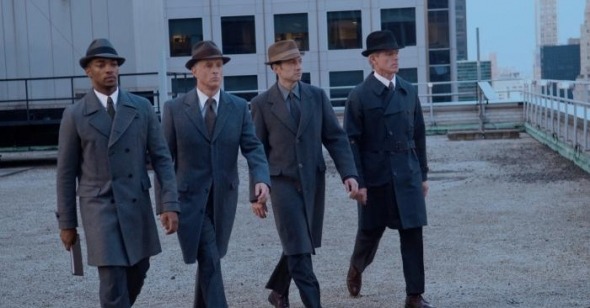Monday Hangover
by Damon Smith and Michael Koresky
The Studio Chairman has a plan for you, Michael—and it’s written on interactive graph paper in a cheap black notebook toted by fedora-wearing angels, also known as flacks. (“We’ve been called that before.”) Be careful of inflection points, though, when you wander off-message. And if you plan to flex your critical free will in writing about this sweetly unconventional romance, rather than follow the PR script about how “grown-up” and “sophisticated” The Adjustment Bureau is (with that all-important caveat for a big-studio picture), watch out for ripple effects! I’ve nothing against love-at-first-sight stories, really, or watching the button-cute, vaguely porcine Matt Damon (as young senatorial contender David Norris) run like a Butterball turkey on crank from yet another retinue of shadowy agents, or peering at English pixie Emily Blunt’s lovely bone-in cleavage, but in trying to mash up every cinematic genre from Bulworth-esque political farce (Damon’s concession speech to his opponent embodies the undying fantasy of authenticity in Hollywood’s treatment of American politics) to Jason Bourne suspense thriller to brainy sci-fi fantasy, screenwriter-turned-director George Nolfi (Ocean’s Twelve, The Bourne Ultimatum) reduces his multidimensional passion play to a silly, slightly autistic finger painting. I wonder how this one was pitched to the execs at Universal . . . Okay, guys, it’s The Truman Show meets Sliding Doors!
But such endless shape shifting is not the real problem with TAB, which amid all the fanciful chance-taking (celestial G-men, enchanted doors) asks to be taken seriously as a meditation on the ancient problem of fate and free will. Too many Hollywood movies “loosely adapted” from Philip K. Dick stories (whether credited or not; Truman writer Andrew Niccol’s shameless swiping of Time Out of Joint comes to mind) water down the wigged-out, schizo futurist’s most radical ideas, which were concerned above all with the mind-bending horrors of authoritarian control. Here, the agents in question forcing Norris and his beloved dancer from blissful union because it does not adhere to “the Plan” are Mad Men’s John Slattery (whose Richardson could body swap with Roger Sterling and never hit a skeptic) and king-of-cold-hearted-villains Terence Stamp (here nicknamed “The Hammer” for his ability to crush officially off-limits romances), but it’s all played for yuks. What really hurts is the feeble attempt to universalize the Dickian “conspiracy” of predestination in utterly harmless, blandly unitarian religious terms; hence, God is “the Chairman,” his on-the-ground agents are “case officers,” and the men who research and implement his master plan (apparently, female seraphim are barred from service in this corporate facsimile of heaven) toil in a facility that looks, well, just like the New York Public Library’s Rose Reading Room. Touting a dubious version of world history to boot (“We took you from hunting and gathering to the heights of Rome. Then we gave you free will, and you gave us five centuries of the Dark Ages”), the film mounts a high-school-age-friendly case for self-determination, aiming to please general audiences who have vague ideas about love and life, the mysteries of chance and afterlife. In other words (worlds?), it all runs according to plan. —DS
At the climax of The Adjustment Bureau—which occurs, like all good angling-for-dystopic Hollywood products, with its heroic characters on an unreasonably altitudinous rooftop surrounded by a vast cityscape meant to represent hope, progress, and dehumanization all at once—Anthony Mackie’s possibly inept guardian angel-cum-bible salesman refers to the Chairman, the film’s unsubtly defined God figure, as “he . . . or she.” The second pronoun is sputtered out quickly, an ass-covering afterthought that seemed to me like a last-minute addition some fed-up script supervisor yelled out on-set. The concession might feel too-little-too-late for The Adjustment Bureau, which—as you point out, Damon—envisions a world behind our world populated by divine fate-controlling overseers who all have fedoras and penises (I presume the latter, since for all we know when they unzip the flies on their Beau Brummels a beam of light blasts out, but these are definitely men’s men, one and all). Perhaps this wouldn’t seem so egregiously sexist if the film’s flimsy plot weren’t based entirely around whether or not the guy gets the girl.
In essence, despite its barrage of anything-for-Matt-Damon political cameos from Bloomberg to Jesse Jackson to Madeleine Albright and the fact that it was based on a Philip K. Dick story, Bureau is plainly little more than romantic comedy, in which fate literally tugs at our central pair of lovers from initial meet-cute to final foot-chase—when Matt Damon and Emily Blunt enact to the letter what Roger Ebert calls the “me push/pull you” sequence, in which our hardy hero must handhold our baffled babe through some intense action gauntlet (outrunning fate is now more prevalent than outrunning a fireball in Hollywood, it would seem). And since he has saved her last-minute, Graduate-style, from her own wedding, she’s rather dolled up in a black evening gown (virginal white would be too pure for this cheeky gal) as she’s yanked through a netherworld New York. The Adjustment Bureau posits that our destinies are written in tattered, digitally lo-fi notebooks of life (better than Wanted’s clunky, nonmobile “loom of fate,” I guess), but women, who apparently are trying to get their dancing careers off the ground while their future husbands are out saving the world (from nuclear destruction?), must merit only a sidebar. Some may take most exception with the film’s gentle ending, which sharply underlines Hollywood’s cautious relationship with totalitarian fantasies—in which no expense is spared to evoke a frightening future world only so that something like love or human determination can conquer all. But if we are to look at the film as less Matrix than Sleepless in Seattle, complete with windswept rooftop climax, then it couldn’t have ended either way, Dick be darned. —MK
